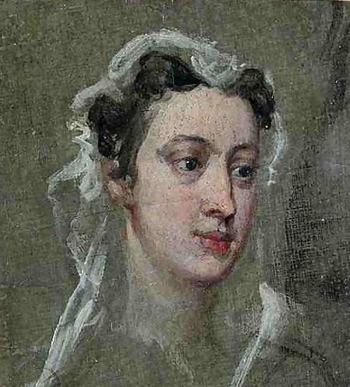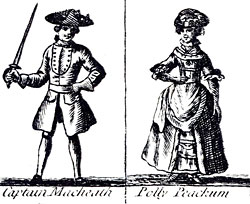The Beggar’s Opera ( we now all know) was the huge success story of C18th theatre and Polly, the sequel was finished in double-quick time and ready by the end of the same year but John Gay was never going to capitalise on his success because he had made too many enemies and these enemies included the prime minister, Robert Walpole.
So, when Polly was complete and rehearsed it was shut down before being performed. A year later it was published to great acclaim but it was not performed for fifty years and Gay was long dead. Which is a pity, because, for a sequel, it’s not too bad.
We all know that sequels are never as good, so does John Gay. The first line of the play admits as much, comparing a sequel to yet more words spoken by a dying man. The Beggar’s Opera opened with a prologue by the writer, an almost penniless poet talking to his patron. This time, the Beggar is having trouble with the success of his previous play because this time he has been able to employ proper actors and proper actors are awkward, selfish and difficult. The actors argue about position and previous parts before the play begins proper.
Peachum is dead and Macheath has been transported so Polly arranges her own passage to America so she can find him. Unfortunately she runs into an old friend, Diana Trapes, a former madam who has been transported for some years. She offers to help Polly but actually sells her to the local landowner as his mistress. She manages to escape dressed as a boy, just when an army of pirates who were formally led by Macheath but now led by the savage black man Morano and his woman, Jenny Diver, one of the prostitutes from the first play who stitched Macheath up.
Somewhere in that lot there are a group of Native Americans, led by the improbable names Poheetohee and his son Cawawkee. The disguised Polly saves the son and becomes a bit of a hero and the Native Americans and the landowners fight off and beat the pirates and hang Morano the leader, who turned out to be Macheath anyway, which means that even today if it were performed (which it won’t) the part of Morano/Macheath would have to be played by a man blacked up. Polly is devastated for about ten minutes before going off with Cawawkee.
Lavinia Fenton, the first Polly Peachum, later married a Duke smitten with her from the theatre
There are fewer big comic set pieces in this play and less deliciously amoral characters, but the satire, though less funny, is sharper and more incisive. There are still some lovely scenes, like the one where the landowner Mr Ducat is being taught the new vices imported from London or the one where the Native Americans find themselves completely lost with the way the English people talk to each other because the Native Americans are used to talking straight.
There is also a great pleasure in seeing Macheath again, this time in a much reduced state. Not only is he blacked up in the guise of Morano but his former lover/betrayer is completely controlling him to the extent that the pirates laugh and joke about him behind his back. It is almost a relief to see him hanged because everything that made him great and heroic in the first play has gone sour. I said in the review for ‘The Beggar’s Opera’ that Macheath is a James Bond figure, representing all that is both admirable and reprehensible in the concept of masculinity and manhood, but in this he is completely unmanned.
Talking of manhood, Polly spends part of the play disguised as a young man. Unfortunately she still doesn’t grow any balls and is quite dull company and that is the problem that affects this sequel, we miss the rogues from the first one.
So, to sum up, good - but not as good. I would like to see someone put it on though.
“A sequel to a play is like more last words. ‘Tis a kind of absurdity.”
Yours




No comments:
Post a Comment